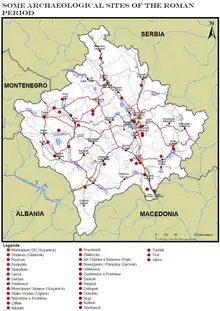.jpg.webp)

42°46′49″N 21°00′01″E / 42.780157°N 21.000181°E Part of a series of articles upon Archaeology of Kosovo
Pestova archaeological site is an archaeological site located in the village Pestova, in the municipality of Vushtrri, on the left side, stretched along the Pristina-Kosovska Mitrovica road, more or less 4 km from Vushtrri. The area is known for a very fertile agricultural land, productive even in present days. [1]
History
During the work carried out in 2005 in Pestova, accidentally some wall contours were discovered. Therefore, a rescue excavation was initiated, which resulted with interesting archaeological findings. On this occasion, remains of a building, ruins of a villae rusticae were partially unearthed. The villas are typical Roman houses set in the countryside and far from the urban centres. As a general rule, villa’s are usually one floor house’s, with atrium or central garden.[2]
According to the Roman architecture rules, villas were complex built structures composed of several accompanied rooms, baths or termae and drinkable water deposits. The Pestova villae rusticae had a corridor Villas in the Roman culture apprehend a luxury house; in the towns they are known as villae urbana, whereas in the countryside they are known as villae rustica, and served as resting houses or places for relaxation for the wealthy and powerful Roman families. Villa’s are consisted of master’s house and the Pestova villa most likely belonged to latifondist family, presumably to a very distinguished and rich Furi or Ponti family members from the ancient site of Ulpiana. Parts of villa complex usually are stables for the domestic animals, workshops and storehouses. [3] When analysing the ancient map Tabvla Imperii Romani, and the site setting of the Pestova villa, it can be argued that most likely, the ancient route that connected Ulpiana with the ancient town of the Municipium DD, passed close or nearby this interesting archaeological site.[4][5][6]
See also
References
- ↑ LISTA E TRASHËGIMISË KULTURORE PËR MBROJTJE TË PËRKOHSHME (PDF) (in Albanian). Republika e Kosovës, Ministria e Kulturës, Rinisë dhe Sportit. Retrieved 17 August 2016.
- ↑ Rexha, Enver, ed. (2013), Harta Arkeologjike e Kosovës (II) (in Albanian), Prishtina: Ministria e Kulturës, Rinisë dhe Sportit & Instituti Arkeologjik i Kosovës, p. 171 - 173
- ↑ "Roman villa in Pestava". Kosovo Cultural Heritage Database. Republic of Kosovo Ministry of Culture, Youth, and Sport. Retrieved 31 August 2020.
- ↑ Berisha, Milot (2012). "Archaeological Guide of Kosovo" (PDF). Prishtina: Ministry of Culture, Youth and Sports of Kosovo. p. 63.
- ↑ "Dyshohet se nën vilën e kohës romake ndodhet një pajton me ar" [It is suspected that a golden phaeton is located under the Roman villa]. Kosova Sot (in Albanian). Prishtina. 10 November 2015. Archived from the original on 2022-10-21. Retrieved October 21, 2022.
- ↑ "Lokalitetet".